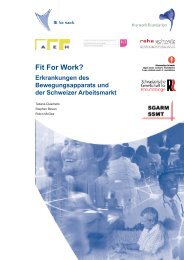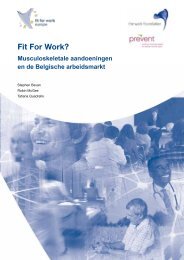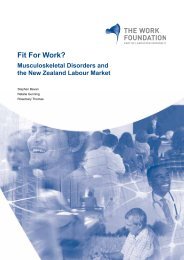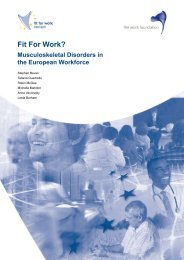FfW Bulgarian report (English language) - Fit for Work Europe
FfW Bulgarian report (English language) - Fit for Work Europe
FfW Bulgarian report (English language) - Fit for Work Europe
Create successful ePaper yourself
Turn your PDF publications into a flip-book with our unique Google optimized e-Paper software.
1. Executive summary<br />
The<br />
‘<strong>Fit</strong> <strong>for</strong> <strong>Work</strong>?’<br />
project<br />
Following the economic downturn, Bulgaria is set to face the shrinking of its work<strong>for</strong>ce. More<br />
skilled workers than ever are leaving Bulgaria in search of better labour market conditions. The<br />
skills gap is exacerbated by the growing number of those dropping out from work due to poor<br />
health.<br />
Acute conditions, such as cardiovascular disease, often grab the headlines in Bulgaria. Amid<br />
the understandable concern about the number of working days lost to those conditions, one fact<br />
seems to have become obscured. Musculoskeletal disorders (MSDs) such as back pain, arm<br />
or neck strains or diseases of the joints are not only the third most common reason <strong>for</strong> absence<br />
from work in Bulgaria, but further contribute to the shrinking of the labour market through<br />
leading to a large number of disabilities and placing a significant burden on the welfare system.<br />
Whilst government bodies in Bulgaria record the prevalence and impact of MSDs, the lack of<br />
communication between various agencies, as well as a lack of standardisation in data collection<br />
has increased the likelihood that the data misrepresents the societal burden of MSDs in<br />
Bulgaria. Tackling the impact of MSDs has to become an immediate priority, and Bulgaria does<br />
have the potential to manage the long-term impact of these conditions.<br />
<strong>Bulgarian</strong> policy-makers, employers and health care professionals must recognise that a large<br />
proportion of the inactive work<strong>for</strong>ce in Bulgaria may in fact be fit enough to contribute their skills,<br />
yet is discouraged from participating in the labour market as a result of stigma around disability.<br />
There is overwhelming evidence that worklessness is, itself, bad <strong>for</strong> health. Job retention and<br />
return to work can positively affect physical health, psychological well-being and raise people<br />
out of poverty. In Bulgaria work has to become an outcome of treatment with better mechanisms<br />
of diagnosis and management of diseases in place to increase individuals’ ability to remain in<br />
and return to the labour market. Ultimately this will reduce the social burden of disease.<br />
This project, part of a wider programme of work across 31 <strong>Europe</strong>an and other countries,<br />
has looked in some detail at the impact that MSDs have on the working lives of thousands of<br />
<strong>Bulgarian</strong> workers, the adequacy of the treatment and support they receive, their experiences<br />
at work, the effect of their condition on their family and colleagues, and the human and financial<br />
costs involved. Specifically, we have looked at back pain, work-related upper limb disorders<br />
(WRULDs) – two groups of conditions which are usually characterised by non-specific and short<br />
episodes of pain and incapacity – and rheumatoid arthritis (RA) and spondyloarthropathy (SpA),<br />
specific conditions that are often progressive and increasingly incapacitating. We conducted<br />
a review of the recent academic and practitioner research on the relationship between these<br />
MSDs and labour market participation, and conducted interviews with acknowledged experts in<br />
this field. The full description of the programme can be found in Appendix 4.<br />
<strong>Fit</strong> For <strong>Work</strong>? 5







